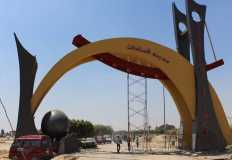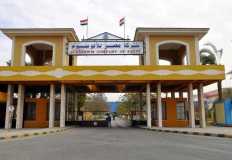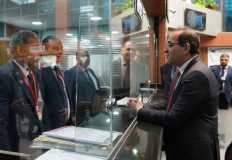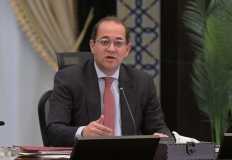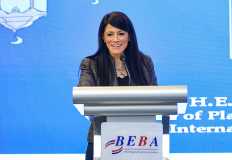
Dr. Moustafa Madbouly, Prime Minister, met with the cabinet to discuss developments in the economic reform program, in cooperation with the International Monetary Fund (IMF), particularly regarding the post-fourth review phase and the reforms to be implemented in the fifth review.
During the meeting, the Prime Minister affirmed the continuation of various efforts to achieve the state's goals in continuing the economic reform process in various fields.
He also pointed to the ongoing coordination between the
government and the Central Bank on various issues, which contributes to
overcoming various challenges and achieving high rates in various economic
indicators, benefiting the daily lives of citizens.
Counselor Mohamed El-Homossany, the official
spokesperson for the Prime Minister's Office, stated that the meeting reviewed
developments in the implementation of the economic reform program, which is
being implemented in cooperation with the IMF, regarding the post-fourth review
phase and the reforms to be implemented in the fifth review. In this regard,
the continued implementation of policies to maintain a flexible exchange rate
and work to increase the private sector's contribution to economic activities
was emphasized.
He pointed out that during the meeting, a number of
structural reforms and measures that the government is working to implement in
the short term were reviewed. These reforms cover many sectors, including the
energy sector, in addition to increasing spending on the "Takaful and
Karama" program.
He highlighted that the meeting proposed several
indicators to track policy implementation progress. These included the
development of an indicator for the share of private investment in total
investments, which would contribute to enhancing monitoring of the
implementation of the State Ownership Policy Document. Another indicator was
also developed to track the divestment of state-owned entities, which was
prepared in cooperation with the Information and Decision Support Center of the
Cabinet.
He further stated that the meeting addressed the latest
developments of the government offerings program, with emphasis on continuing
work on offering recently announced companies, whether through public offerings
on the stock exchange or to a strategic investor. The meeting reviewed debt
reduction efforts, noting that the government has a plan to convert a portion
of the current debt into investments, which would contribute to reducing the
debt ratio. The meeting also highlighted a significant decline in inflation
rates and the near return of monthly inflation rates to their pre-2022 pattern.
This decline was due to several factors, including the impact of the monetary
policies pursued by the Central Bank since March 2022. The decline in inflation
was driven by the decline and stability of food commodity prices.
During the meeting, negotiation efforts with the
European Commission regarding the second phase of the Macroeconomic and Budget
Support Facility (MABF) and its timeframe were reviewed. The structural reform
measures were highlighted. The cabinet reviewed ongoing silo projects,
confirming that these projects aim to increase storage capacity and are being
implemented in several governorates in cooperation with several international
partners. Additionally, a presentation was given on the "Business
Readiness" report, issued annually by the World Bank Group.
The report seeks to assess the investment climate and
ease of doing business throughout a company's lifecycle, from inception to
closure. This report is an extension of the Doing Business report, which was
discontinued in 2021. The fundamental differences between the Doing Business
and Business Readiness reports were also clarified.
It was emphasized that the report's importance stems from its role as a strategic reference for reforms, guiding governments towards adopting the required reform policies in legislation, procedures, and digitalization, in order to provide a competitive and attractive investment environment, based on global best practices.
